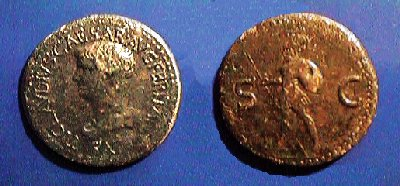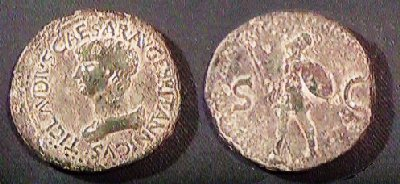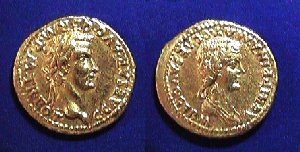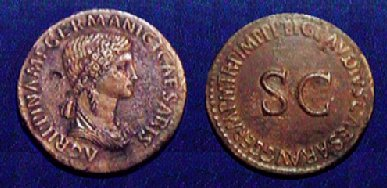Claudius

Emperor 41 – 54 AD
Born 10 BC – Died 54 AD, age 64
Tiberius Claudius Drusus was the younger son of Nero Claudius Drusus, (son of Livia) and Antonia, daughter of Mark Antony and Octavia. Claudius was born at Lyons on August 1st, 10 BC. He was struck by a childhood attack of infantile paralysis, which had left him with a somewhat deformed appearance. Because of this, some to assumed that Claudius was weak-minded. Suetonius described Claudius as ‘tall but not slender, with an attractive face, becoming white hair and with a full neck. But when Claudius walked, his weak knees gave way under him and he had many disagreeable traits…he would foam at the mouth and trickle at the nose; he stammered besides and his head was very shaky at all times.’ The surviving portraiture does not reflect such a description, but his deformities were noticeable only when he moved or spoke.
Claudius’ deformity was something of an embarrassment to his family and, therefore, he took little part in public life, with the exception of being made consul and a senator by his nephew Caligula , perhaps originally intended to be a joke on the Senate.
As a child, Claudius’ mother had ignored him and displayed little love and even less affection. Antonia was reported to have called him a monster of a man. Claudius in turn became a devoted historian and spent much of his time at antiquarian studies. He authored histories of Etruscan and Carthaginian civilization as well as an autobiography. Unfortunately, none of these are known to have survived.
Upon the assassination of his nephew, Caligula, in 41 AD, the German imperial bodyguard were ready to plunge the city into a general massacre as they hunted down the assassins. The Senate tried to muster support among the suburban cohorts to retake power, but failed to gain the support of the Praetorian Guard. As the story goes, upon the discovery of Caligula’s uncle Claudius hiding behind the curtains in the palace, he was hailed Emperor by the soldiers on the same day as the assassination, thus ending the Senate’s move to restore the Republic.

Gold Aureus Showing Praetorian Camp
The Senate was left with little alternative. Claudius was immediately advised to stand firm, and the troops were thus paid a donative of 15,000 sesterii per man insuring the succession of power. Claudius was 50 years old at the time of his rising to the throne.
Claudius’ first action as Emperor was to deal with the assassins of his nephew Caligula. Claudius sentenced Cassius Chaerea to death for striking the first blow and Julius Lupus for the murder of Caesonia and her child. Sabinus was pardoned, but he committed suicide out of loyalty to his less fortunate co-conspirators.
Claudius abolished the treason trials that had been used again by Caligula in part to confiscate the wealth of his victims. Claudius also burned all the criminal records and destroyed Caligula’s infamous collection of exotic poisons. He also returned much of Caligula’s confiscation and ended Caligula’s practice of paying legacies to the Emperor. All these acts were an attempt the reassure the people and the Senate that he was not like Caligula.
Despite his best efforts, several attempts on Claudius’ life were made. Over 35 senators and 300 knights were executed for suspicion of plots or attempts. Some of these were plots invented by Claudius’ wife Messalina. But there was a major rebellion that broke out in 42 AD, led by Lucius Arruntius Camillus Scribonianus—the governor of Dalmatia. The rebellion collapsed within five days, exposing several prominent senators.
Still the credit for the conquest of Britain belongs to Claudius. Where other family members had failed since the time ofJulius Caesar, Claudius succeeded. The conquest began in 43 AD and took several decades to complete. Claudius only spent 16 days in Britain. Nonetheless, the conquest greatly enhanced his prestige, but this would not last. In total, Claudius added no less than five provinces to the Roman Empire, including Lycia, Mauretania, Noricum and Thrace. Claudius also extended Roman citizenship to many of the provinces with particular favor toward his birthplace—Gaul. He even raised several Gaulish leaders to the rank of senator. Claudius’ speech on this subject has survived on an inscription from Lyons as well as in condensed form by Tactius. At the very least, Claudius changed the relationship between Italy and the provinces seeking equality for the first time in Roman history.

Bronze Sesterius showing the Port of Ostia
issued by Nero
Claudius spent a good deal of his time personally attending to the building of the Port of Rome (the harbor of Ostia, the design of which provided inspiration for the building of St Peter’s at the Vatican). The purpose of this project was to end the grain shortages that had plagued Rome for many years. Claudius also substantially improved the water distribution system, which was started by his nephew Caligula, notably the Aqua Claudia, which was praised by the historian Frontinus, calling it the “Opus Magnificentissime Consummatum.” The daily volume of the spring water collected by the Aqua Claudia amounted to 4,607 quinariae, of which there was a reserve of 1,600 quinariae always available. The water from the aqueduct, which was slightly over 43 miles long, reached Rome on August 1st, 52 AD, the birthday of Claudius. The aqueduct Anio Novus, which was started by Caligula in 38 AD, was also completed by Claudius four years later. It was over 54 miles long. The completion of these two aqueducts by Claudius increased the water supply of Rome by approximately 30 percent. An inscription above the Porta Maggiore read that Claudius “took charge of the waters of the Claudia, leading them into the city from the springs called Caeruleus and Curtius at a distance of forty-five thousand feet at his own expense.”
Claudius was an unfortunate husband. At the age of 15 he was betrothed to Aemilia Lepida, the daughter of Augustus’granddaughter—the younger Julia. The match was called off when her parents fell out of favor at court. The next in line was his betrothal to Livia Medullina, who died on the day of their wedding. Claudius’ first wife was Plautia Urgulanilla, whom he divorced in 24 AD for adultery and suspicion of murder. Their son Claudius Drusus choked on a pear after throwing in the air and trying to catch it in is mouth. Their daughter, Claudia was disowned while still a child.
Aelia Paetina was Claudius’ next wife. She bore him a daughter they named after Claudius’ mother, Antonia. Claudius divorced her in 38 AD in order to marry the more prestigious Valeria Messalina, who was then only 18 years old when Claudius was 50. She bore Claudius two children, Tiberius Claudius Germanicus, later called Britannicus following his father’s conquest of Britain, and a daughter named Octavia.
Messalina became a ruthless Empress who plotted, manipulated Claudius and had rivals executed, including a number of distinguished senators. One of her victims was Julia Livilla, the sister of Caligula, who came back from exile in 41 AD only to be sent back again to be murdered.
In addition to the plots and murders of Messalina, she is perhaps best known to history for her adulteries. Her lovers were numerous—from influential senators to mere actors. Her orgies were even famous. But Messalina finally went too far. While Claudius was at Ostia, Messalina openly married one of her lovers, Gaius Silius, in October of 48 AD. It was most likely an open attempt at a coup d’etat, but certainly she could not have been thinking clearly. Confusion emerged with many fearing to take sides. Claudius’s faithful secretary, Narcissus, saved the day by rushing Claudius to the safety of the praetorian camp where Silius was dragged before him and executed. Messalina was also executed without being given the opportunity of an audience with Claudius, fearing that she would once again manipulate him in her favor.
Following the disastrous affair with Messalina, Claudius married one last time at the prompting of Pallas, and influential member of his staff. This time the candidate was Caligula’s last surviving sister— Agrippina Jr, who was rumored to be the lover of Pallas. They were married in 49 AD—Claudius was 58 years old. The marriage required a special dispensation from the Senate due to the fact that she was his niece.

Claudius & Agrippina Jr Aureus
Agrippina’s main goal was to clear the way for her son, Lucius Domitius Ahenobarbus (Nero), to succeed Claudius ahead of his son Britannicus. Nero was officially adopted by Claudius in 50 AD, and he took the family name of Nero. In 51 AD, Nero was raised ahead of Britannicus to the rank of Princeps Iuventutis (Leader of Youth). This clearly marked him as the heir to the throne.

Claudius & Nero Aureus
Besides adding her own portrait to the coinage, Agrippina insured that Nero’s portrait began to appear on both the silver denarius and gold aureus. At first, Nero’s portrait was placed on the reverse side of the coinage along with that of Claudius. Eventually, coinage simply baring the youthful portrait of Nero appeared in both silver and gold. This was a political maneuver to promote Nero, while Britannicus was absent from the main coinage issues in Rome. In effect, the future had been prepared by Agrippina, and the coinage was used to inform the people just who the next Emperor would be.
Agrippina began to prepare for the future by replacing the leadership of the Praetorian Guard with Afranius Burrus. The path to power and the fate of Nero was sealed by the marriage of Nero to Claudius’ daughter Octavia. All that remained was the death of Claudius.
Why Claudius allowed Agrippina such a free reign is a mystery. He was reported to be heard saying ‘that it was his destiny first to suffer and finally to punish the infamy of his wives.’ Perhaps he pushed Britannicus aside because he could not forgive him for his mother’s betrayal, or he may have suspected that he was not really his son. Whatever the reason, Claudius seemed to know that he was going to be poisoned by Agrippina.
Claudius seems to have been dealt a very sad hand of cards in life—from enduring notorious wives to failing to win the respect he wanted from the Senate and the people. Claudius’ character has eternally been criticized for allowing himself to be dominated by his wives and by his close officials.
Claudius was intensely interested in justice and the state, taking personal interest in the courts. Instead of earning the respect of the people, Claudius was often criticized for his capriciousness and unpredictability of his judgments.
The ruthless reputation of Claudius may not have been justified, but it was at least enhanced by his avid support of sporting games. It was said that Claudius enjoyed watching the faces of combatants as they died. Whether or not this is true or an exaggerated account is not known. It does seem as though anything Claudius tried to do was intensely criticized. Even the Secular Games held in 47 AD to mark the 800th anniversary of the founding of Rome were ridiculed as being somewhat less impressive as those of Augustus held thirty years prior.
Titles and Powers, A.D. 41-54.
Yr Tribunician Power Imperatorial Acclamation Consulship Other
41 TR.P. IMP. – IMP.IV. AVGVSTVS. P.M.
42 TR.P. – TR.P.II. COS.II. P.P.
43 ———————– COS.III.
44 TR.P.III. – IIII IMP.V. – VII.
45 TR.P.III. – V. IMP.VIII.
46 TR.P.V. – VI. IMP.VIIII. – XI. BRITANNICVS.
47 TR.P.VI. – VII. IMP.XII. – XIII. COS.IIII. CENSOR.
48 TR.P.VII. – VIII. IMP.XIV. – XV. CENSOR.
49 TR.P.VIII. – VIIII. IMP.XVI.
50 TR.P.VIIII. – X. IMP.XVII. – XX.
51 TR.P.X. – XI. IMP.XXI. – XXIII. COS.V.
52 TR.P.XI. – XII. IMP.XXIIII. – XXVI.
53 TR.P.XII. – XIII. IMP.XXVII.
54 TR.P.XIII. – XIIII.
NOTE: Claudius first given the consulship in 37 AD. He received the tribunician power on January 25th, 41 AD, and it was subsequently renewed each year on that date.
Monetary System

Silver Denarius
Mints: Rome, Lugdunum (?), Ephesus, Pergamum, Caesarea.
Obverse Legends:
TI CLAVDIVS CAESAR AVG
TI CLAVD CAES AVG
TI CLAVD CAESAR AVG PM TR P IMP
TI CLAVD CAESAR AVG PM TR P IMP PP
TI CLAVD CAESAR AVG PM TR P IIII
TI CLAVD CAESAR AVG PM TR P VI IMP XI
TI CLAVD CAESAR AVG GERM PM TR P
with Agrippina
TI CLAVD CAESAR AVG GERM PM TRIB POT PP
Posthumous
DIVVS CLAVDIVS AVGVSTVS by Nero
TI CLAVDIVS
CAESAR AVG PM by Titus & Domitian
DENOMINATIONS
AU Aureus (6.54 grams)
AU Quinarius (4.61 grams)
AR Cistoporous
AR Denarius
AR Quinarius
Æ Sesterius
Æ Dupondius
Æ As
Æ Semis
Æ Quadrans














 Agrippina fell victim to the plots of Sejanus, the ambitious Praetorian Prefect. Sejanus pretended to be her friend while all the time intentionally trying escalate the feud between her and Tiberius by telling each that the other was scheming to poison them. To Tiberius, who was innocent of any involvement in her husband’s death, Agrippina appeared to be a relentless and unreasonable woman. She enraged Tiberius when dining with him by accusing him of persecuting her friend, which in fact was being conducted by Sejanus. When Tiberius offered her an apple, she refused to eat it, on the advice of Sejanus who knew it would outrage Tiberius.
Agrippina fell victim to the plots of Sejanus, the ambitious Praetorian Prefect. Sejanus pretended to be her friend while all the time intentionally trying escalate the feud between her and Tiberius by telling each that the other was scheming to poison them. To Tiberius, who was innocent of any involvement in her husband’s death, Agrippina appeared to be a relentless and unreasonable woman. She enraged Tiberius when dining with him by accusing him of persecuting her friend, which in fact was being conducted by Sejanus. When Tiberius offered her an apple, she refused to eat it, on the advice of Sejanus who knew it would outrage Tiberius.










 38 – 9 BC
38 – 9 BC

